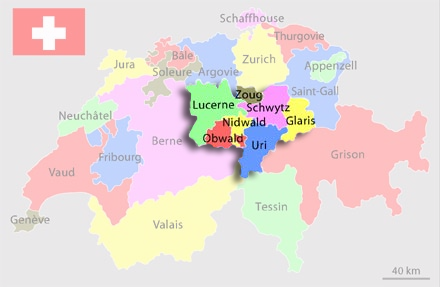|
 I know the arguments
through which people praise the so-called progress that
the big national masses are supposed to be. I know the arguments
through which people praise the so-called progress that
the big national masses are supposed to be.
But this is very arguable.
Must it be repeated about France, where The
Revelation of Arès has been delivered, that the
1789 French revolution has not given their freedom to the
ethnic groups which had been annexed to the kingdom, that
it overthrew?
The republic has appropriated the complete power over the
complete territory, which the bunch of princes had
appropriated (Rev of Arès 1/7) previously.
That agglomerate as well unjust as inconsistent, which is
becoming more and more obvious, has been abandoned to the
political power's greed, but in whose name can we rebel
against it today? In The Revelation of Arès's
name,
Penitence — that is, love, forgiveness, peace,
kindhearted intelligence and men's absolute
freedom — that the Father calls on human beings
to practice can be lived on only in small groups of men.
How can small sovereign units of men stay alive in
happiness? I have not been much interested in some 400
micronations, a lot of which have been short-lived and
unreliable, or in about thirty microstates (Malta,
Andorra, Iceland, Cook Islands, etc.). I have especially
looked into two patterns of nation, which are very
different from each other. One of both is quite sovereign
as regards religion: Jews closely joined in the
denomination most free in the world, Judaism with its
"ageless absolutely immemorial insubmissive nature"
(Bernard-Henri Levy), but not sovereign as regards
economy, at all, and utterly scattered. The other one is
less far from my concept of small sovereign economy: The
small historical cantons of the Helvtian Confederation or
Swiss, which are sovereign states. It was possible for me
to be over in those cantons and study them in October 2015
thanks to a couple of Swiss Arès Pilgrims.
The modernity of society is not found in the large masses.
The age-old struggle against the ideolatry of politics and
even power cannot be carried through successfully but in
small nations, that the Father says will
move back to Him (Rev of Arès 28/21). Of
course, the small Swiss cantons are not inhabited with penitents,
but when small penitent economies will draw
their inspiration from those cantons and be developping,
God's Day (31/8) will not be long coming.
I give the readers of the blog the notes in full, that I
took when I was away on a trip there. Fifty 14.5x21 cm
pages of notes in my handwriting lacking in text
structuring and filled with repetitions, which I ask the
reader to forgive, but I think that the notes as such have
the insight of sincerity and of a hard thinking I
continuously did everywhere around the 4-Cantons Lake.
Having said this, a man my age is aware that it is always
through its own deeds and habits that the mind meets with
the truth and makes mistakes. Alain said that one has to
"build bridges over abysses" whenever one has to do the
right thinking. So I filtered my obervations through my
own sieve and I possibly misjudged a few things. But I
have to make a first move.
______________________________
NOTES TAKEN DURING MY 2015 TRIP IN
THE HISTORICAL SWISS CANTONS :
Schwytz (in the Confedération ever since 1291) population
146.000
Uri (in the Confedération ever since 1291) population
35.000
Nidwald (in the Confedération ever since 1291) population
41.000
Obwald (in the Confedération ever since 1291) population
35.000
Lucerne (in the Confedération ever since 1332) population
377.000
Zug (in the Confedération ever since 1352) population
113.000
Glaris (in the Confedération ever since 1352) population
38.000
All of these cantons are small people units each of them
being a totally sovereign nation, a part of the Helvetian
Confederation.
I think that a human organization whatever is only
justified if very limited objectives have been set. Man
shall be absolutely free [Rev of Arès 10/10]
— he has been created for freedom —, so society
cannot guarantee freedom but in small free restricted
units.
Politics like religion is nothing more than an
occupational business. A person is a minister, a senator
or a member of the parliament just as a person is a
bishop, a rabbi, a priest, a minister, an imam, an
ayatollah, a guru. In reality, if politics were meant to
the right management of society but no more than that, it
should be operated by anybody, but not by the initiates or
professionals. The fact that politics or religion are
reserved for initiates gives other people, the citizens, a
right to curiosity. Managing society should be based only
on a few straightforward rules of common sense, but it
does no go that way any more, because nations are too
large, too much populated, too much diverse within
themselves.
A man, who wants soundly to weigh up the conditions of his
happiness, has to realize his situation within his society
clearly. He can't possibly do so outside a small unit of
men.
I cannot exercise my right to curiosity, if I live in a
nation too much populated nation and consequently too
complex or even too much complicated. Some men and women
have been aware of this a long time, so they have to
reduce the settlements they live in to small people units.
.Which seems to be the canton's Swiss people's
situation... (you can
read on in French)
The text is only
available in French (see the French entry)
|

 I know the arguments
through which people praise the so-called progress that
the big national masses are supposed to be.
I know the arguments
through which people praise the so-called progress that
the big national masses are supposed to be.